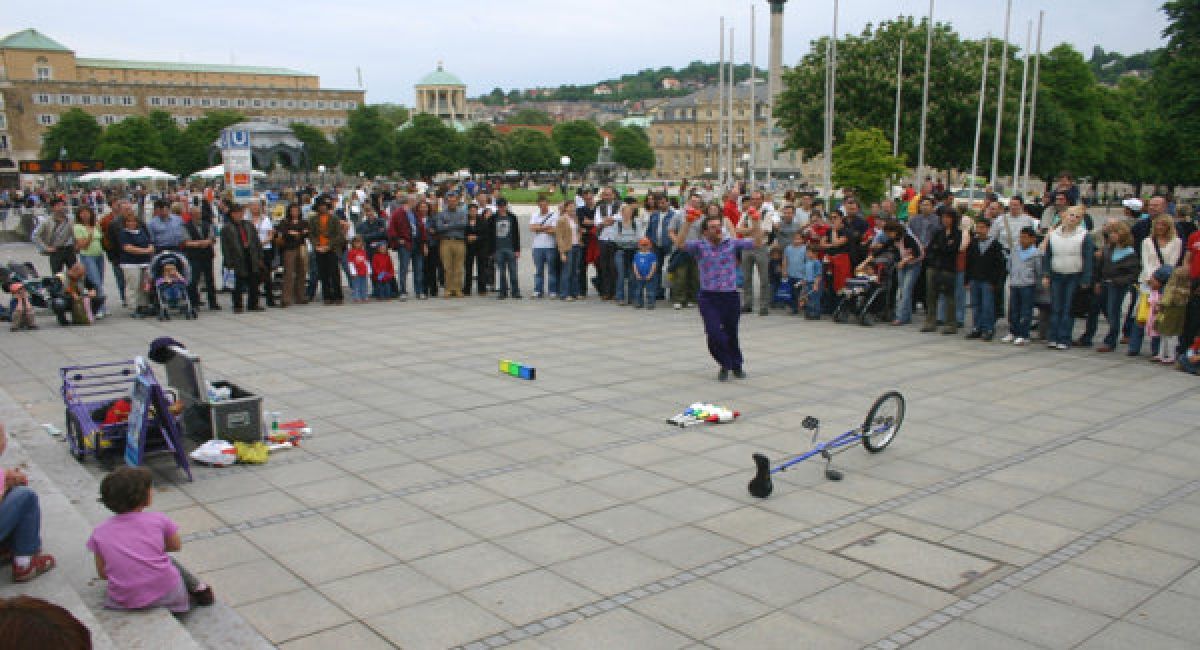
Where are you from, Tom, and what are you doing nowadays?
My name is Tom. I am a professional clown and juggler. I was born in Puerto Rico but mostly grew up in Dayton, Ohio where I also attended University. I have a BS in Finance/Economics. I started juggling and uni-cycling while in University, paying my expenses with street shows. After graduation, I decided to try being a performer and ended up in Europe in 1983. I used to travel throughout Europe during the warmer months, doing street shows, especially in Germany. Winters were usually spent traveling in Asia, Latin America, Africa, Austria and New Zealand. I eventually married a German woman and switched to getting paying gigs for festivals and company and private events.
Why did you choose to move to Germany?
Germany is basically in the middle of Europe, so not as seasonal as Scandinavia. I used to enjoy Southern Europe as well, but it was tougher to make money there. I eventually acquired passable French and Spanish, but it was still easier to do shows in English and one could get away with this better in Middle-Europe than in the South. I then bought a van and, later, a motor home to travel in. In countries like Germany, Austria or Switzerland, one was much less likely to have one's vehicle broken into than in much of Southern Europe, although junkies in Norway were notorious for this as well in the 80's and 90's.
What were the procedures to follow to for a US national to move there?
I was basically based in Europe well before I got married, but officially as a tourist. Back then, one got 3 months or more for each country as an American. Even this was rarely controlled at land crossings. But to get a work permission as a self-employed performer, it would have been complicated and difficult, and always for a period of 6 months to 2 years with no guarantee that it would be extended. An official in the German office for foreign residents told me that the only realistic way to have a long-term work permit in my case would be to get married.
I managed to live from street shows, but couldn't advertise or take paying gigs as a tourist. I eventually got married, so this problem was solved. I had to get an official statement from the US consulate that I was not married before and this paper had to be translated by a registered translator. I think it took a couple of months before I had the permit. Then, I had to go to Standesamt (city hall) to get married. Then, with my marriage certificate, I had to apply for a residency visa which was valid for 3 years and limited to my declared profession as a performer.
After 3 years, I went to get my residency extension which should have been automatically unlimited (as opposed to permanent). The officials tried to say that since my wife didn't have a job that this was a risk, I would be given another time limited residency. I had to inform them that I knew my rights as an American citizen and demanded to see their boss before they gave in. This showed me that German officials do not always do things correctly. One needs to know your rights or they can try to fool you. But the rules cans be different for different nationalities and situations. So just because someone else had a similar situation doesn't mean that the exact same rules will always apply. I also have to say that officials don't like the idea of a self-employed performer because there is no job security. On the other hand, as an American national, I was probably less scrutinized than if I had been from a third world country.
How long have you been in the country?
I am married and have officially been in Germany since 1996 although as mentioned previously, I spent a lot of time here since 1983.

What has attracted you to Stuttgart?
While Stuttgart is more conservative than say Hamburg, it has a strong economy and few problems. It is large enough to offer much in terms of culture and sports. Yet, it is compact with most of the shopping, cinema, bars and restaurants located in the city-center. There is little crime and no neighborhoods where one would feel unsafe. Stuttgart has a long, wide pedestrian street, the Königstr, with a large plaza, the Schlossplatz, in the middle providing multiple possibilities to street perform.
What has surprised you the most at your arrival?
I guess it would be the level of English in Germany. It's better than in Southern Europe and everyone has to take multiple years of it in school. But many people are not so good at it, probably because they don't get to practice it. I formerly spent a lot of time in Holland and Scandinavia where the English is much better. However, people from there know that few people speak their language and much of the movies, TV shows and books coming from America are left in their original language. Thus, I met Scandinavian kids who spoke perfect American English, even before starting school. They had simply watched a lot of TV!
Yet, I was a bit slow to start learning German as enough people know it to get by as a visitor. When I arrived in Europe, I did not know I would end up living in Germany. It was just one of the many countries I had traveled through. Out of necessity, I learned a lot of Spanish and French before I really attempted to learn German. But I can say with certainty, if one lives here one really needs to learn the language. One could survive, but be at a constant disadvantage, always dependent on others' help. I am no natural at languages and will always have an accent and make grammar mistakes but my passive comprehension in German is extremely good. So I cannot always express myself as concisely as I would wish, but I know what is going on around me.
Anyone thinking they will manage to live here indefinitely without learning the language is kidding themselves. Yes, it is hard but one does not have to expect perfection.
Was it difficult to find accommodation there? What are the types of accommodation which are available there?
The first time I was confronted with actually looking for a place was when I moved to Stuttgart in 2000. I had spent a lot of time there earlier, but actually stayed in my motor home and lived elsewhere in the region. For younger people, there are Wohngemeinschafts or WGs which are shared apartments or homes. One gets a room and shared usage of bathroom and kitchen and possibly a living room and/or balcony. This is a popular situation for students or young workers, but not so fitting when one gets a bit older or doesn't want to deal with communal living. I looked to rent an apartment but it was difficult.
Stuttgart is expensive and many places were badly situated and designed. Any reasonable place was then desired by hordes of people. While I didn't experience any outright discrimination as a foreigner, I found I had no chance as a foreign self-employed person. Who is a renter going to feel safer with, an American clown struggling to get gigs or the nice German physician/lawyer couple with good jobs? I ended up buying my own apartment which turned out to be a good investment. Property values are quite high now in Stuttgart, but on the other hand, interest rates are low if one needs to take out a mortgage.
How do you find the German lifestyle?
I have my own way of doing things which is a mixture of customs and habits, not only from America and having been so long in Europe, but also from having traveled the world. I mostly feel free to do things the way I want, but try not to be too obtuse about anything that might not be seen as German.
Have you been able to adapt yourself to the country and to its society over these years?
I don't feel it is my job to change the society, so while I stick to my values, I find it best as a foreigner to keep a rather low profile. If people see me as an example of how to do some things differently, fine. If they don't accept my ways of thinking, then I don't beat them over the head with it.

What does your everyday life look like in Stuttgart?
When I get up, I do yoga, eat breakfast, take care of any important emails, take my cat to the park, have lunch, write any important business correspondence or updates to my website. I then go to the supermarket, go train my juggling, read the International New York Times at the University library. Finally, I have dinner and drink a beer while watching TV or wasting time on social networks.
Any particular experience you would like to share with us?
I would refer back to the difference between unlimited and permanent residency. Once I had my unlimited residency, I was also unlimited in my field of work. I could now stay as long as I wanted in Germany but even after years of this situation, leaving the country for more than a year for any reason would cancel my residency permit. It would then be a matter of starting all over. If I had divorced in the meantime, maybe I wouldn't even be allowed back despite having an apartment and my livelihood here.
Eventually, I fulfilled the requirements to apply for a permanent residency upon passing a test. Two years ago, I had to get a new passport. To my surprise, when I went to get the residency permit, I found out that as an American, having lived over 15 years continuously in Germany without any legal problems, I was given permanent residency status without any further test or requirements. I believe this was something that was forced on Germany to comply with certain EU laws. Even at customs now, I was told I can use the lane for EU citizens instead of the one for "others". I'm not sure what restrictions apply to other nationalities but this status is a great relief.
What is your opinion on the cost of living in Stuttgart ? Is it easy for an expat to live in the country?
Stuttgart is one of the more prosperous areas in Germany and as one would then expect, one of the more expensive ones. Easy to live in Germany? I think it depends on many factors. First of all, what are one's expectations? And again one gets back to language. One is treated better and has more opportunities by mastering the language. I get along fine but say I was going to give up performing and go look for a job, it would be difficult since my German does not reflect my high level of education.
I've known a lot of people from third world countries who were doctors or lawyers or had some other professional job but ended up as waiters in Europe. They either didn't have the language skills to get a comparable job, or it was simply not allowed. Yet they made money to send home to their families. Such situations might be a boost in the long run for some, but seem such a shame, such a waste of talent, not just personally but for their home country having lost one of their more educated people.
What are the differences between life in Germany and in your home country?

In some ways it is hard for me to say as I have not lived in the US since 1983. I think the biggest difference is that Americans are often obsessed with individuality and Germans have more sensitivity towards social aspects. This means less guns and violence and extreme poverty in Germany and much fairer possibilities for education. Moreover, most American city centers are just office buildings with no character or life. People live in the suburbs. I really like the fact that in Germany, like in most European city centers, you can still find public life in city centers where one can see and meet people while shopping, or going out to eat or for entertainment.
Do you ever miss your home country?
No, I really don't miss America other than the fact that people are a bit more open. This is a paradox in light of my remarks about American individuality. Europeans often see them as being superficial but Americans are a bit more laid back when it comes to initially meeting people. Not every encounter is going to lead to a deep friendship, but hard to start any kind of a relationship with someone if you never get to even speak to them. One generally needs to have a shared interest or occupation to meet in Germany while in America, just being at the same bus stop is reason enough to start a conversation.
Would like to give any advice to soon-to-be expats in Germany?
Learn the language. But for anyone seriously thinking of immigrating, then be realistic. I often see posts from people saying "help me to get to Germany" or some other place. This website is a place to share information and not to beg for sponsorship or funding. Such postings typically follow the same routine, ask for help but without asking any serious questions or presenting what one might have to offer to a country. If you have no education or job skills, then your chances of getting to any new place are limited and unlikely to end in success.
Money and jobs don't just grow on trees in America or Europe. Working a crap job, having little money and not knowing people or the language is not an easy situation, and for some people it would honestly be better for them to stay home. Unfortunately, when I try to point out the difficulties of succeeding here or question one's seriousness while lacking any skills, then I often get accused of being some kind of mean racist or something.
The more specific the questions one asks, the more likely they will get a helpful answer. Trying to convince people that you can fund yourself coming from a third world country but that someone should "help you out" and sign as a sponsor - with the argument that this is just a formality and will not lead to a financial liability is nonsense. Then to act like you are being prosecuted for your race or religion when you don't like the responses you get is annoying.
What are your plans for the future?
Try to keep on performing, hopefully, with enough success that I can still live simply, yet continue to travel.



















